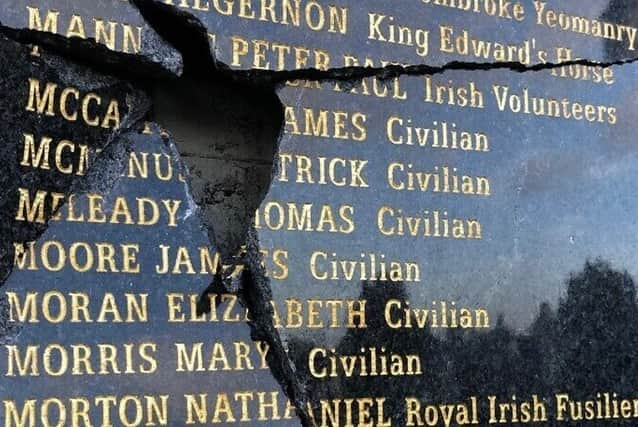‘Hatred and narrow nationalism’ behind attack on Dublin memorial


The wall at Glasnevin Cemetery was to have contained the names of all those who died in the conflict ann then civil war that occurred between 1916 and 1923.
All British soldiers and Royal Irish Constabulary dead would eventually have been added along with civilians and IRA members.
Advertisement
Hide AdAdvertisement
Hide AdHowever, the owners of Glasnevin – the Dublin Cemeteries Trust – have decided to “discontinue” the project following this third attack since the first phase was unveiled in 2016.
Irish deputy prime minister Leo Varadkar said he has “no criticism of the Trust” as it was “forced into this decision,” but added: “It is terrible and a huge setback for reconciliation. Those who repeatedly vandalised the wall were driven by feelings of hatred, narrow nationalism and anger.”
On Twitter, former foreign affairs minister Charlie Flanagan said: “All those whose names are engraved on the Glasnevin memorial wall shared our common humanity. Death does not distinguish between civilian, volunteer, soldier – All are equal in death.”
Prince Charles laid a wreath at the wall during a visit in 2017.
Advertisement
Hide AdAdvertisement
Hide AdSenator Gerard Craughwell, a former soldier with the Royal Irish Regiment, also tweeted his disgust at the attack.
“This thuggery does not represent the Ireland I love. Are we giving way to fascists & so-called nationalists and letting them decide who what and how we remember. Disgusting people. #notinmyname,” Senator Craughwell said.
However, Clare Sinn Fein TD Violet-anne Wynne posted message on Twitter, saying: “The vandalism at #glasnevin is not a setback on reconciliation, it has nothing to reconciliation and the future of this Island despite the Tánaiste message of the day.”
In a statement accompanying the tweet, she said: “It commemorates a group of people that caused so much pain in this country, killing people and raiding the homes of innocent people.”
Advertisement
Hide AdAdvertisement
Hide AdAontú leader Peadar Tóibín said: “I oppose vandalism of any sort but what madness was this, commemorating violent British gunmen who often killed Irish people seeking their democratic and civil rights.”
The Éirigí group said it opposed the wall “from day one,” and added: “The very idea that a single monument would contain the names of civilian, republican and British dead was ill-conceived at best and pushing a warped historical narrative at worst.”
Politicians in Northern Ireland have also been commenting on the vandalism.
TUV leader Jim Allister, in response to an RTE news report, tweeted: “Another compelling advert for the ‘New Ireland’. No thanks!”
Advertisement
Hide AdAdvertisement
Hide AdAlso on Twitter, former DUP MP Emma Little Pengelly said: “This should be retained and kept as a living memorial to intolerance.
“There is a beautiful Japanese tradition of ‘repairing with gold,’ but even in this state, I think it is profound. To hate so much to do such a thing. Hard to understand, a terrible example of what hate and intolerance is.”
A spokesperson for the Dublin Cemeteries Trust said: “The board of Dublin Cemeteries Trust, following several acts of vandalism to the Necrology Wall within the grounds of Glasnevin Cemetery, which caused significant damage, has taken the decision, with great regret, to discontinue the Necrology Wall element of its 1916-1923 remembrance activity.
“The damaged Necrology Wall will be replaced by plain black granite panels on a date yet to be finalised. The original wall on which the Necrology Wall is inscribed has been in place since the inception of the Glasnevin Cemetery Visitor Centre in April 2010.
Advertisement
Hide AdAdvertisement
Hide Ad“It is the firm view of Dublin Cemeteries Trust that if the wall were to be repaired for a third time it would be vandalised again. Dublin Cemeteries Trust is not in a position to cover the costs of continually repairing the wall or in the position to provide the security that would be necessary to ensure its protection, nor to guarantee the safety of staff and visitors in the case of further attacks.”
The statement also said that while a review process looked at a number of repair and preservation options, “no option could provide a viable, long-term solution, given the inevitability of further attacks”.
The spokesperson said the trust will “continue the process of researching the names and stories of those who died because of the conflict during this period in Irish history,” and added that: “Remembrance and reflection of this time period will be continued by the trust in other formats”.
——— ———
A message from the Editor:
Thank you for reading this story on our website. While I have your attention, I also have an important request to make of you.
Advertisement
Hide AdAdvertisement
Hide AdWith the coronavirus lockdowns having had a major impact on many of our advertisers — and consequently the revenue we receive — we are more reliant than ever on you taking out a digital subscription.
Subscribe to newsletter.co.uk and enjoy unlimited access to the best Northern Ireland and UK news and information online and on our app. With a digital subscription, you can read more than 5 articles, see fewer ads, enjoy faster load times, and get access to exclusive newsletters and content.
Visit https://www.newsletter.co.uk/subscriptionsnow to sign up.
Our journalism costs money and we rely on advertising, print and digital revenues to help to support them. By supporting us, we are able to support you in providing trusted, fact-checked content for this website.
Ben Lowry, Editor